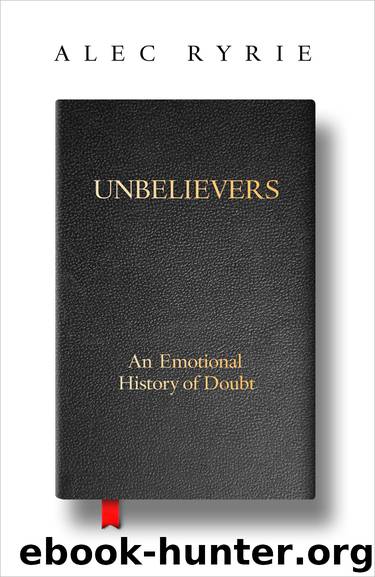Unbelievers by Alec Ryrie

Author:Alec Ryrie [Ryrie, Alec]
Language: eng
Format: epub
Publisher: HarperCollins Publishers
Published: 2019-09-23T17:00:00+00:00
5
Seeking and Losing Faith
‘Whereof one cannot speak, thereof one must be silent.’
Ludwig Wittgenstein, Tractatus Logico-Philosophicus
‘It’s a Great Matter to Believe there is a God’
While religious establishments were panicking about the mostly imaginary atheism of amoral Machiavellian libertines, a quite different form of unbelief was bubbling up under their noses: an unbelief of anxiety, assaulting earnest Christians from within. It is not what either the anti-atheists of the time, or historians of atheism since, lead us to expect, but it makes a certain amount of sense. In early modern times, atheism and unbelief were active stances. They required some commitment, given that custom, habit, society and law all made a quiet religious conformity the path of least resistance. Those with no interest in religion might neglect it, but they would not take a stand against it. They might be bad Christians, but would hardly rise to being anti-Christian. Only those who cared enough to believe also cared enough to doubt.
We have seen how those who suffered from this kind of doubt classed it as a temptation, and tried with mixed success to overcome it. That effort might suggest that their experience does not matter very much. They were unwilling conscripts into atheism’s army, and deserted as quickly as they could. But their efforts to realign themselves with God’s cause were rarely a simple return to their former duties. Their determination to fight for their faith using the lessons they had learned from their sojourn with unbelief gave the battle an unexpected twist.
Christians commonly assume that doubt is a bad thing. According to thirteenth-century canon law, someone who doubts the faith is by definition an infidel. ‘Doubting Thomas’ has never been a compliment. According to one exhaustive treatise on that famously sceptical apostle, his reluctance to believe Christ’s resurrection ‘tendeth … wholly to his discredit’, for doubt is the most terrible and pervasive of all sins. ‘To be doubtful in religion,’ warned another moralist, ‘is to be certain of the greatest punishment.’[1] This is why early modern books of prayers so regularly featured prayers against doubt, and why doubters feared judgement for their faithlessness.
But anyone who stopped to think about the matter realised that this was inadequate. Even canon law was more nuanced than it appeared. Medieval theologians distinguished between ‘deniers’ and ‘doubters’, the former deserving condemnation, the latter sympathy.[2] Doubt was, as we have seen, a temptation, not a sin. And when God permits the devil to tempt his people, he does so for a reason. Temptation is not simply a meaningless attack to be repulsed. It is a trial by combat: a training arena from which the victor emerges stronger. It is to be feared, but it is also an opportunity to be grasped.
The much-quoted Bible verse – ‘Lord, I believe; help thou my unbelief’ – implies that faith and doubt are not alternatives but companions, inevitably intertwined. This is true in the obvious sense that Christians’ faith is weak and incomplete. For seventeenth-century commentators, however, the deeper point was that this mixture was a good thing.
Download
This site does not store any files on its server. We only index and link to content provided by other sites. Please contact the content providers to delete copyright contents if any and email us, we'll remove relevant links or contents immediately.
Angels by Billy Graham(1549)
How To Be Born Again by Billy Graham(1404)
Peace with God by Billy Graham(1318)
Unbroken Curses by Rebecca Brown & Daniel Yoder(1180)
God's Prophetic Symbolism in Everyday Life by Adam Thompson & Adrian Beale(1130)
The School of Biblical Evangelism by Ray Comfort(1100)
Martin Luther: The Man Who Rediscovered God and Changed the World by Eric Metaxas(1089)
Power over the Enemy by John Osteen & Joel Osteen(1076)
Call by Rick Joyner(1056)
Jonathan Edwards: A Life by Marsden George M(954)
The Supernatural Power of a Transformed Mind Expanded Edition: Access to a Life of Miracles by Bill Johnson(947)
Unmasking the Devil: Strategies to Defeat Eternity's Greatest Enemy by John Ramirez(924)
Prayers That Bring Healing and Activate Blessings: Experience the Protection, Power, and Favor of God by John Eckhardt(920)
Fresh Wind, Fresh Fire by Jim Cymbala(913)
An Altar in the World by Barbara Brown Taylor(903)
Reformation Theology by Littlejohn Bradford(887)
Liturgy of the Ordinary by Tish Harrison Warren(878)
Seeing the Voice of God: What God Is Telling You through Dreams and Visions by Smith Laura Harris(873)
Martin Luther by Mansch Larry D.; Peters Curtis H.;(859)
